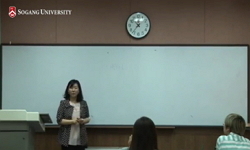In this paper, I will show how the affective domains, which form the core of literary education, are reflected into elementary level curriculums and textbooks, what the problems are with present methods and what alternative methods are to be applied. ...
http://chineseinput.net/에서 pinyin(병음)방식으로 중국어를 변환할 수 있습니다.
변환된 중국어를 복사하여 사용하시면 됩니다.
- 中文 을 입력하시려면 zhongwen을 입력하시고 space를누르시면됩니다.
- 北京 을 입력하시려면 beijing을 입력하시고 space를 누르시면 됩니다.

문학교육과 정의적 발달 : 초등학교 문학교육의 정의적 영역의 문제와 교육방법 = The Problems with the Affective Domain in Elementary-level Literary Education and the Ways to Overcome Them
한글로보기https://www.riss.kr/link?id=A40100650
- 저자
- 발행기관
- 학술지명
- 권호사항
-
발행연도
2003
-
작성언어
-
-
주제어
정서(情緖) ; 정의(情意) ; 교육과정 ; 언어적 스펙트럼 ; emotion ; affectivity ; curriculum ; linguistic spectrum
-
KDC
800
-
등재정보
KCI등재
-
자료형태
학술저널
- 발행기관 URL
-
수록면
69-92(24쪽)
- 제공처
-
0
상세조회 -
0
다운로드
부가정보
다국어 초록 (Multilingual Abstract)
In this paper, I will show how the affective domains, which form the core of literary education, are reflected into elementary level curriculums and textbooks, what the problems are with present methods and what alternative methods are to be applied. Affectivity is a quality that has an effect on the way that one responds to an object emotionally. This is an essential factor in constructing attitudes, values and interests toward lives in a desirable way. However, this concept has many problems in terms of the system of constructing curriculums and the teaching methods as follows: First, the concept of attitude is applied not toward lives but toward literary works themselves, and understood not as an affective but as an declarative one, which leads to a great deal of confusion in literary education. Second, we have had to face limitation to helping children understand the essence of literature. It is because, when we teach literary works such as children stories and poems, we have approached them from the perspective of linguistic function instead of artistic subjects. The fundamental reason for this problems lies in the fact that the goals and systems of language education are constructed along the linguistic function. This paper suggests solutions to those problems in the following: First, learner-centered texts must be made in the way that they, considering the appropriateness of children s developmental stages, reflect the validity of affective domains. Second, the strategy of questioning has to be developed to activate affective thinking. Third, the spectrum of language must be widened to activate affective thinking. Fourth, the pedagogy of affective domains in elementary-level literary education has to be established in the direction that children experience literature fully and construct their own views on lives.
동일학술지(권/호) 다른 논문
-
문학교육과 정의적 발달 : 국어과 교육과정에서의 정의교육 범주에 대한 연구 -내용 체계 및 위계의 문제를 중심으로-
- 한국문학교육학회
- 김정우 ( Kim Jeong U )
- 2003
- KCI등재
-
문학교육과 정의적 발달 : 감상의 정서적 거리 -교육과정변인이 문학감상에 미치는 영향-
- 한국문학교육학회
- 최지현 ( Choe Ji Hyeon )
- 2003
- KCI등재
-
문학교육과 정의적 발달 : 중등학교 문학교육에서 정의적 영역 평가의 문제
- 한국문학교육학회
- 한창훈 ( Han Chang Hun )
- 2003
- KCI등재
-
동아시아 아동문학의 회고와 전망 : 동아시아 아동문학교육의 지향점
- 한국문학교육학회
- 신헌재 ( Sin Heon Jae )
- 2003
- KCI등재





 KISS
KISS




